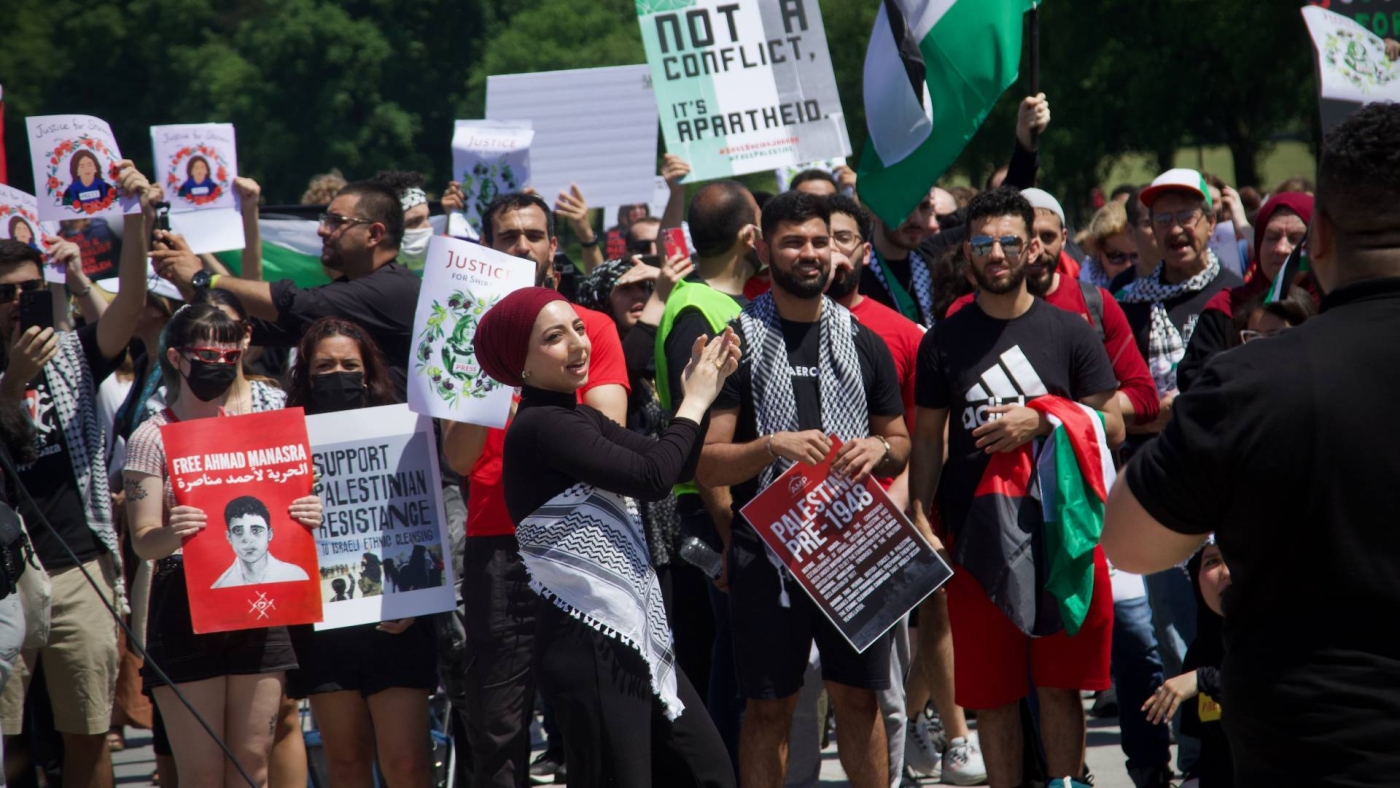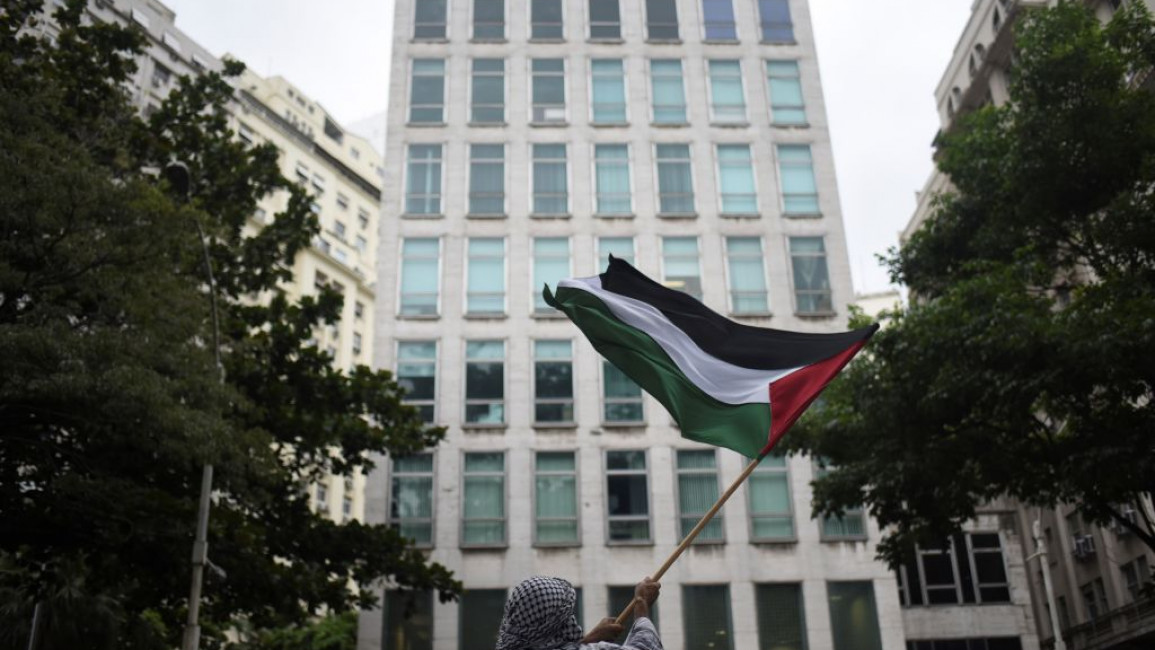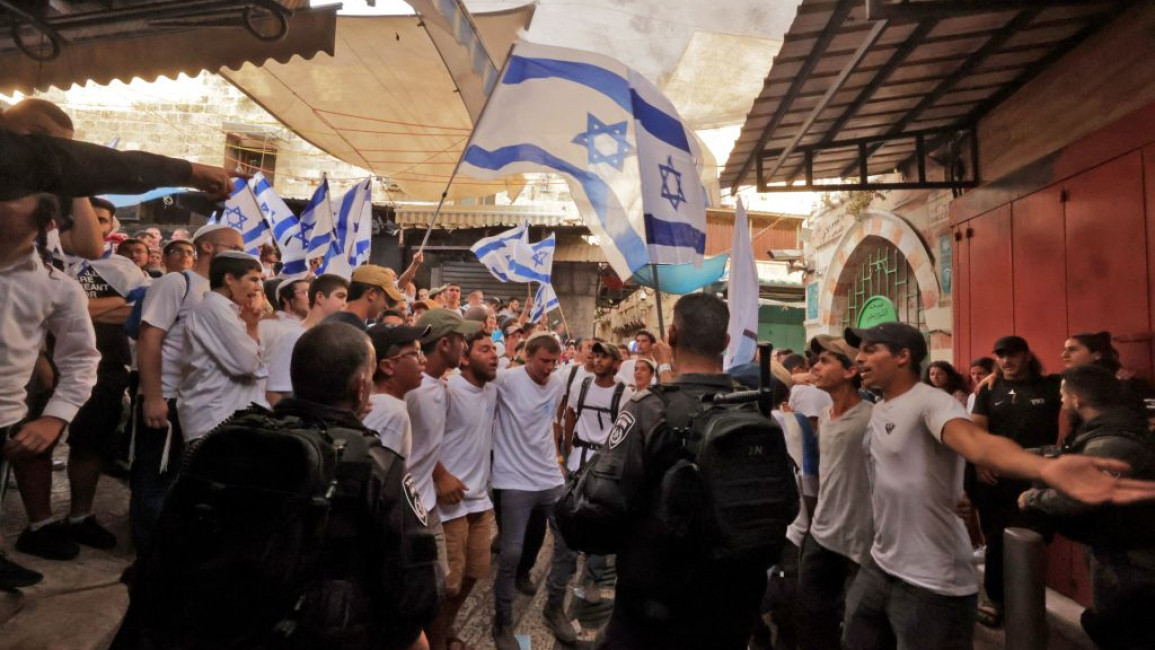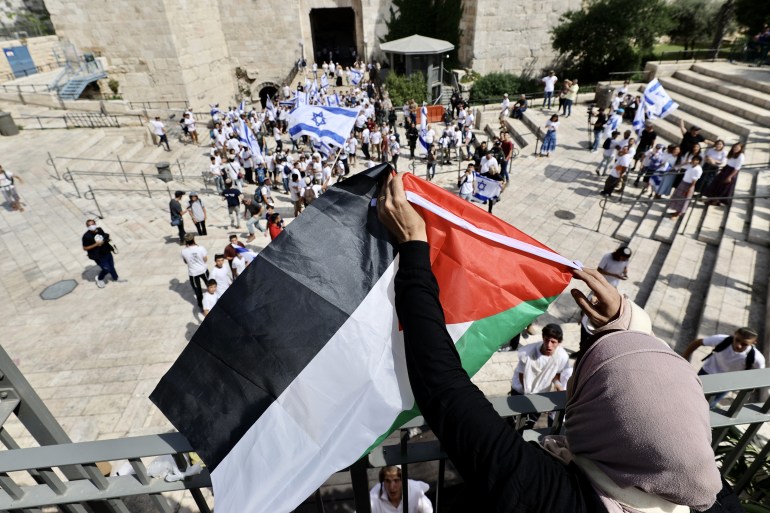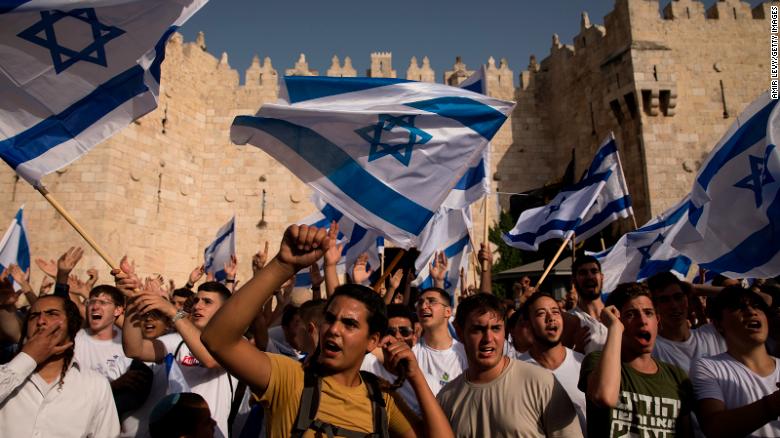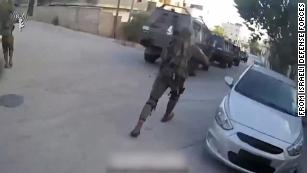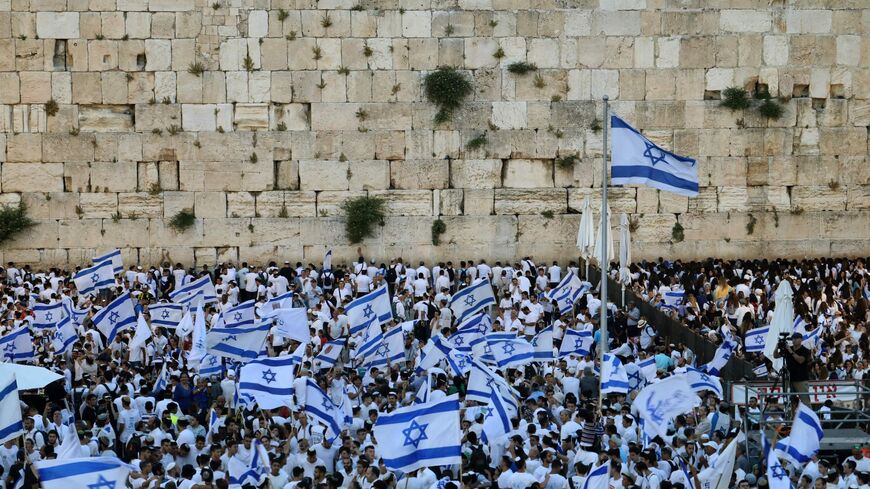Israeli youth at Jerusalem flag march reveal vision of a far-right future
Teens from across Israel flooded Jerusalem's Old City on Sunday to sing racist songs, fly Lehava banners and praise Itmar Ben-Gvir as their choice for prime minister

Demonstrators gesture as they gather with Israeli flags during the 'flag march' outside the Old City's Damascus Gate on 29 May (AFP)
By Lubna Masarwa in Jerusalem
Published date: 30 May 2022
At Jerusalem’s Old City on Sunday was a glimpse of Israel’s future.
Tens of thousands of Israelis crammed into the historic walls and gates, the majority adolescents, with a smattering of families.
This gathering, the ultranationalist “flag march” commemorating Israel’s 1967 capture of East Jerusalem, was one of the sparks that last year ignited a war in Gaza, and civil strife between Jews and Palestinians across Israel.
But as Israeli youth sang “Muhammad is dead” and “we are not afraid”, there was no evidence of lessons learnt from last year’s deadly unravelling.
If anything, Israel’s far-right youth felt emboldened - and growing more so. Israeli police estimated 70,000 people participated in the march, which a police spokesperson told Middle East Eye was far larger than previous years.
'If we face any resistance by the Arabs in the Old City we will break them'
- Israeli youth
At the Jaffa Gate, it was clear that an event that once was predominantly attended by Israeli settlers had now become mainstream: teens had been bussed in by their schools from various corners of the country.
Elon and Eran*, both 16, were brought to Jerusalem from the coastal city of Ashkelon by their school.
“We came here today to show that Jerusalem belongs to us and not to others. We are not afraid, we are here to emphasise that Jerusalem belongs to us and will remain to us,” Elon told MEE.
Surrounded by Israeli flags, symbols of the far-right Lehava group and T-shirts emblazoned with aggressive slogans, Elon and Eran acknowledged that they could understand the Palestinian cause - but Jerusalem and the land between the Jordan river and Mediterranean Sea “belong to us”.
“We will keep fighting to keep it in our hands. At the end of the day, we will be here forever,” said Eran.
'We need someone like Ben-Gvir'
Recent weeks have seen a succession of Palestinians shot dead by Israeli forces in the occupied West Bank, including Al Jazeera journalist Shireen Abu Akleh, and attacks inside Israel by Palestinians of various backgrounds.
A shocking Israeli assault on Abu Akleh’s funeral in Jerusalem - seemingly over the presence of Palestinian flags - only worsened anger and resentment ahead of Sunday’s march.
Several youths in the Old City cited the recent Palestinian attacks as reasons for their own drift rightward. Though Israel’s government is headed by a hawkish right-winger - Naftali Bennett - it is weak and unwieldy, and blamed for the worsening security situation.
Yet on Jerusalem’s stone streets, it is not former prime minister Benjamin Netanyahu who is making political gain of Bennet’s woes, but rather Itamar Ben-Gvir, a former follower of Jewish supremacist Meir Kahane, and the face of Israel’s burgeoning and openly racist far-right.
“The state is in a bad situation, with the economy and the latest attacks on Israelis. We need someone like Ben-Gvir,” said Eran.
'Even though some describe him as extremist, Ben-Gvir is very charming and cute'
- Moira, 17
“Ben-Gvir says loudly what he believes in, he doesn't fear anyone or what they think about him, and this is the only thing that can create change.”
Shira, a 16-year-old from southern Israel’s Beer Sheba, and Moria, a 17-year-old from Yavne near Tel Aviv, cry out in unison when asked who their next prime minister should be: “Ben-Gvir.”
They describe him as strong, honest and fearless. He is seen as the only man who can impose Israeli sovereignty over Jerusalem’s Palestinians.
Ben-Gvir, who marched in Jerusalem on Sunday surrounded by adoring supporters, entered Israel’s parliament in 2020 at the initiative of Netanyahu in an unsuccessful attempt to keep him in power. Now opinion polls show Ben-Gvir’s party gaining more seats than Bennett’s in any future election, which seems more likely to be called with every new political crisis that emerges.
There’s a good chance you’ll find Ben-Gvir at any flashpoint event, goading Palestinians with racist language and openly carrying firearms. But for Shira and Moira, that kind of behaviour is just part of his charm.
“Even though some describe him as extremist, he is very charming and cute,” said Moira.
'God is watching over us'
There are 300,000 Palestinians currently living in Jerusalem, but if many of the Israeli youth that attended the flag march had their way, those Jerusalemites would be expelled from their homes.
Moira believes the solution to the Israel-Palestine conflict lies in the removal of Palestinians.
“We should help the Palestinians to immigrate from here, they have 30 other countries, and we only have one,” she said. “Maybe we can allow those who accept our sovereignty to stay.”
Shira disagrees: “We have to expel all of them.”
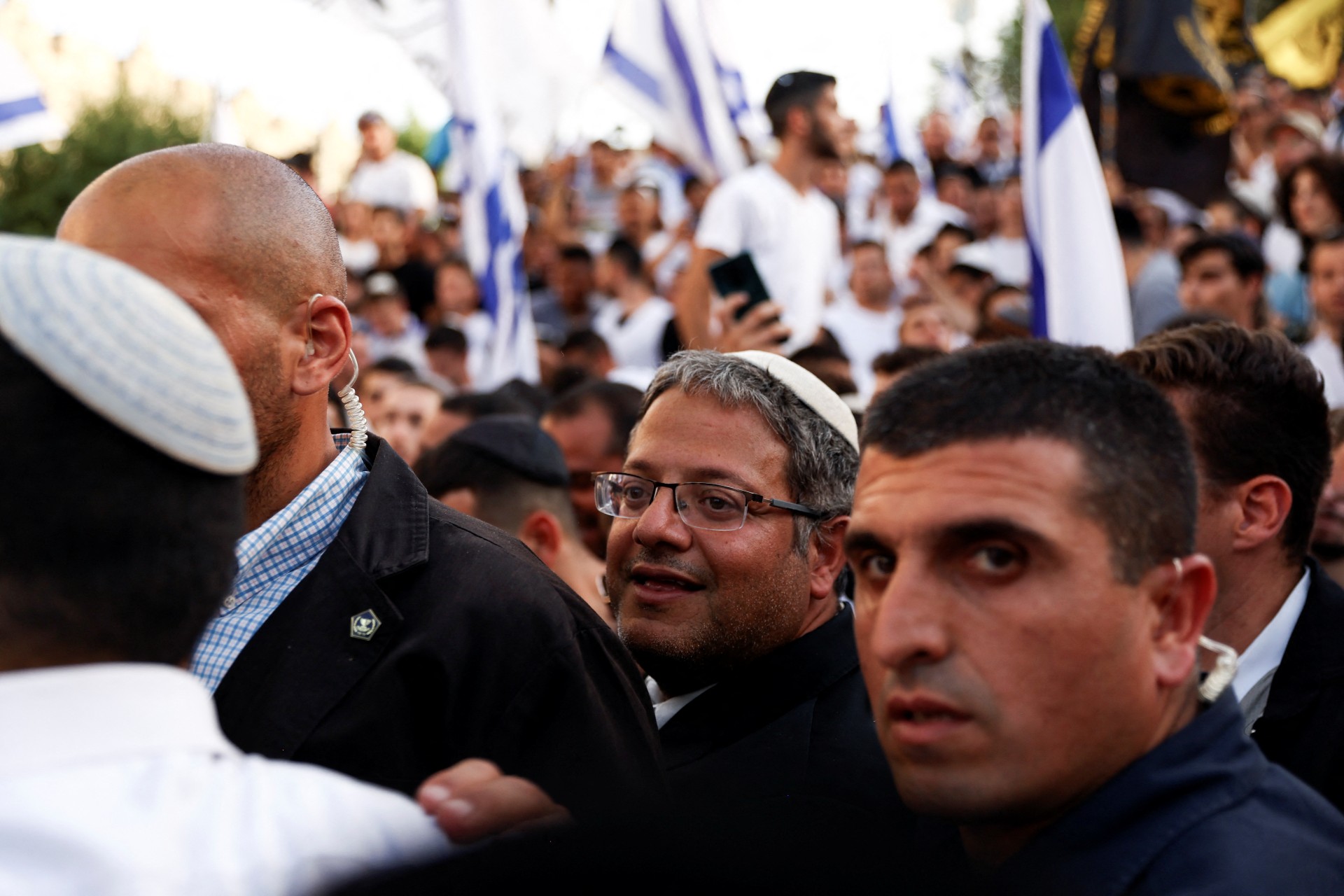
Israeli far-right MP Itamar Ben-Gvir is escorted by bodyguards, as he visits Damascus Gate to Jerusalem's Old City as part of the Jerusalem Day events 29 May (Reuters)
This kind of open hostility to Palestinian Jerusalemites and citizens of Israel has always been a part of Israeli public life - but it has not manifested in aggressive marches under heavy police protection until recently.
Riyad al-Hallaq owns a coffee shop on al-Wad Street, the main route from the Damascus Gate to al-Aqsa Mosque through the Old City.
“In previous years the march was much smaller and it passed by our shops peacefully without our shops getting attacked,” he told MEE.
On Sunday, Palestinian businesses and homes were trashed, spat on and graffitied, and Palestinians assaulted by Israeli marchers.
“This is a very significant event for us, especially this year,” said Moira.
“It was important for us to come and to show the Arabs that we are not afraid and that Jerusalem belongs to us.”
Outside the Jaffa Gate, a group of teenage girls sang and danced, draped with Israeli flags. They’d come all the way from a string of towns along Israel’s boundary with the Gaza Strip.
“You should understand that we are strong and God is watching over us,” one said. “If we face any resistance by the Arabs in the Old City we will break them.”
*Some names have been changed



